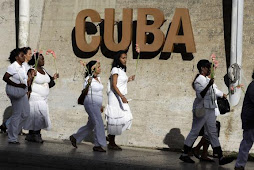Speaking of Legitimacy / Fernando Damaso
Posted on April 14, 2015
Fernando Dámaso, 8 April 2105 — The claim that governmental
organizations and associations are the sole representatives of Cuban
civil society to the exclusion of all others not legally recognized by
the authorities figures prominently in public statements and actions by
leaders and officials of the regime and is a frequent topic in articles
by academics and some official journalists.
Government leaders and officials simply state it. Academics try to
provide a rationale for it while journalists generally disparage, accuse
and repeat tired slogans.
The idea that “civil society has advanced beyond the primitive stage to
the point that it is organized to serve political ends, with the state
directing and regulating it,” is not only absurd, it amounts to blatant
manipulation.
Equating civil with civilized is very crude, especially when the words
are associated with primitivism. It amounts to nothing more than a
digression into theory that is intended to confuse the gullible and lead
them to simply accept the claim that “Cuban civil society is represented
only by organizations and associations directed and regulated by the state.”
Certainly, some of these organizations — including those founded by
women, students, workers and farmers before independent organizations
were directed and regulated by the state — have historical roots.
But after they were forced to merge into a single organization under the
aegis of the state, they lost their civil character and became mere
instruments, with some performing the grim tasks of monitoring and
denouncing those who did not agree with government policy, participating
in so-called “repudiation rallies” and other such repressive activities.
Those which refused were considered illegal. No wonder all of them
boasted of having been created by the commander-in-chief, the highest
ranking government official, and of being unconditionally loyal.
It was during this “historicist” transition that the Federation of Cuban
Women, the Committees for the Defense of the Revolution, the University
Student Federation, the National Association of Small Farmers, the Union
of Cuban Pioneers, the Cuban Workers Center and all the other “sole”
organizations — with the “sole party” being the jewel in the crown —
emerged.
The most massive of these organizations and associations, which are said
to be made up of millions of citizens and tens of thousands of children,
fill their ranks through political coercion. Although their official
guidelines stipulate that membership is a voluntary decision by each
citizen, in practice this is not the case. Political pressure, both
direct and indirect, is exerted both at the neighborhood level and in
the workplace.
In the first instance it is a concern about “what people will say.”
Preferring not to seem apathetic to the government, most adopt a
convenient “double standard” in order to avoid problems in their
neighborhoods.
In the second it plays a fundamental role. Aware that bosses and
directors report to authorities, no one wants to give the impression of
“standing apart from the collective” by acting “different.” The goal is
to keep one’s job or position and to not lose the “bonus” for being
“trustworthy.”
This phenomenon can currently be seen in attempts by government labor
unions to get all private business owners to join their ranks, and in
pressuring private producers and self-employed workers to form cooperatives.
The figures published on membership are qualitatively questionable. Only
a minority remain actively engaged in these organizations. Most are
members in name only, paying their monthly dues and avoiding taking on
any responsibility, especially in leadership, from which they flee as
though it were the plague. The authorities are well aware of this
situation, and regularly issue pleas for activism and a fighting spirit
within these organizations.
None of this means that turnout in the next mid-term elections,
scheduled for April 19, will not be high. The same is true for the May 1
election in which, according to a statement in the government-run press,
“millions of happy and spirited citizens will turn out, giving thanks
for the many gifts they have received from the authorities.”
Civic mindedness has been confused with civic irresponsibility and
fanaticism, two evils that have become entrenched in the minds of many
in the population, leading to symptoms of “herd mentality syndrome.”
Source: Speaking of Legitimacy / Fernando Damaso | Translating Cuba -
http://translatingcuba.com/speaking-of-legitimacy-fernando-damaso/
Subscribe to:
Post Comments (Atom)





No comments:
Post a Comment